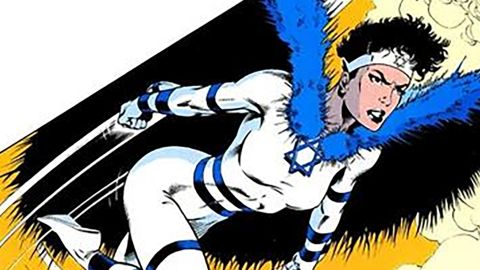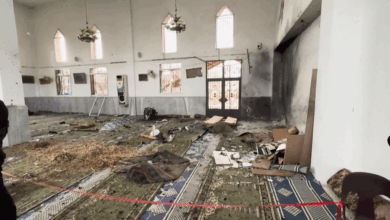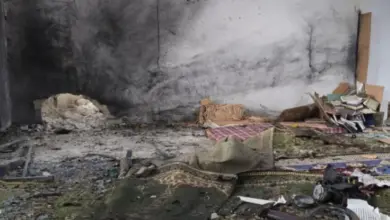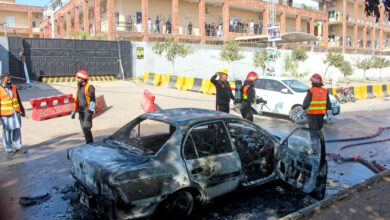
The classic 1981 Marvel comic page shows the giant green Hulk, tears streaming down his face as he yells at Sabra, an Israeli superhero and agent of the country’s Mossad spy agency. The corpse of a young Palestinian boy, killed in an explosion by apparently Arab “terrorists” at his feet.
“Boy died because boy’s people and yours both want to own land! Boy died because you wouldn’t share!” the Hulk says.
A few panels later, the woman in the white and blue costume with a Star of David on her chest kneels next to the boy.
“It has taken the Hulk to make her see this dead Arab boy as a human being,” the comic says. “It has taken a monster to awaken her own sense of humanity.”
Sabra, the Israeli superhero, made numerous appearances in Marvel’s comics over the years, starring alongside top icons such as the Incredible Hulk, Iron Man and the X-Men.
More than forty years after Sabra was introduced, Disney’s Marvel plans to bring her to film in “Captain America: New World Order,” set to be released in 2024. That has created an uproar among those who fear that reviving Sabra’s character would spread offensive stereotypes about Arabs and the dehumanization of Palestinians in cinema.
Critics say many of the Arab characters she interacted with in the comics are shown as misogynistic, antisemitic and violent, and are questioning whether the troubling portrayals of Arabs will play out differently in the film.
“That comic doesn’t suggest anything positive about how this film will play out,” said Yousef Munayyer, a Palestinian-American writer and analyst based in Washington, D.C. “The whole concept” of turning Israeli spies into heroes “is insensitive and disgraceful.”
“The glorification of violence against Palestinians specifically and Arabs and Muslims more broadly in mass media has a long and ugly history in the West and it has remarkable staying power,” he added.
Waleed F. Mahdi, author of “Arab Americans in Film: From Hollywood and Egyptian Stereotypes to Self-Representation,” said the “US-Israeli alliance” in cinematic narrative since the 1960s has celebrated American and Israeli law enforcement and intelligence agencies as good forces “committed to deterring violence that has been chiefly linked to Arabs and Muslims.”
“Marvel’s announcement of adapting the comic character of Sabra is a reflection of this legacy,” he told CNN.
A Marvel Studios spokesperson told CNN that “filmmakers are taking a new approach with the character Sabra who was first introduced in the comics over 40 years ago,” adding that characters in Marvel Cinematic Universe “are always freshly imagined for the screen and today’s audience.”
Even some Israelis say Sabra may not be a superhero for our times. Etgar Keret, an Israeli author, scriptwriter and graphic novelist, told CNN that the original Sabra character was created in a different era with a “simple and clear story”.
“This Sabra was created before two [Palestinian] Intifadas [uprisings], it was created before the failing of the Oslo Accords – it was created in a totally different reality and state of mind,” he said. “And now… it’s tough to keep this kind of icon of simplicity.”
The superhero’s name is a nickname for a Jewish person born in Israel or the occupied territories, and stems from the Hebrew term for the fruit of a prickly pear. It has been in widespread use since the 1930s, before Israel was established.
But the word is spelled the same way in English as one of two Palestinian communities in Lebanon where a massacre of more than 1,000 Palestinian and Lebanese Shiite civilians was carried out by Lebanese Christian militiamen allied to Israel during the 1982 Lebanon-Israel war – known as the Sabra and Shatila Massacre, named after the places in which it occurred.
In 1983 the Israeli government released The Kahan Commission of Inquiry into the events that occurred at the refugee camps and found the Israeli army indirectly responsible. It concluded that the army approved the militiamen’s entry into the area and didn’t take appropriate measures to prevent the killings. Ariel Sharon, then defense minister, was forced to resign as a result of the inquiry’s findings.
Marvel’s Sabra character was created before the Sabra and Shatila massacre and has no relation to it, but the announcement to bring her to cinemas just a week before the massacre’s 40th anniversary has touched a raw nerve with Arabs, who accuse the film studio of being insensitive to one of the most tragic events in the history of the Palestinian people.
“It’s not just in the timing or the name but also in the fact that the massacre itself was led by a Mossad-linked [militia] in territory under Israeli military control,” said Munayyer. “Given all of this, it is hard not to conclude that the people at Marvel are either abjectly ignorant about the region, its history and the Palestinian experience, or that they deliberately aimed to kick a people living under apartheid while they were down.”
Although Sabra would not be the first time Israel’s intelligence agency has been given the Hollywood treatment, it is the first time the Mossad has been given a supernatural status to the level of a mega, blockbuster superhero. Experts say that’s a public relations win for the agency.
Avner Avraham, a former Mossad officer and founder of the Spy Legends Agency which consults for film and TV shows portraying Israeli spies, said the new portrayal will help a younger generation learn about the Mossad.
“This is the ‘TikTok’ way, the cartoon way to talk to the new generation, and they will learn about the word Mossad,” Avraham said. “It helps the branding. It will add a different audience.”
Such exposure can even help Mossad recruit sources and assistance in other countries, he added.
“The fact that they decided to take a Mossad agent, a Sabra, and they didn’t take an Egyptian agent or Italian agent, it shows Mossad is a big name,” Avraham said.




